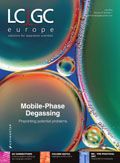Events: 34th International Symposium on Halogenated Persistant Organic Pollutants (Dioxin 2014)
Events
34th International Symposium on Halogenated Persistent Organic Pollutants (Dioxin 2014)
The 34th International Symposium on Halogenated Persistent Organic Pollutants (Dioxin 2014) will be held at the Hotel Meliá Castilla in Madrid, Spain, from 31 August–5 September 2014. This international symposium was first held in Rome, Italy, in 1980, and has been held in different cities around the world ever since. The Dioxin conference is one of the biggest international meetings and has previously attracted up to 1200 delegates from over 40 different countries, always counting on the invaluable support from multiple key sponsors and exhibitors.

PHOTO CREDIT: ROBERTO BOWYER/GETTY IMAGES
Halogenated persistent organic pollutants are mostly man-made chemicals that pose a recognized threat to humans and the environment. This year, Dioxin 2014 will continue to present recent advances in all areas dealing with these contaminants by gathering a scientific community determined to look for new scientific strategies, policies, and technological advances to protect the global environment from these and other related chemicals, and preserve human health and the ecosystem worldwide.
High-quality plenary lectures will be presented by the following leading scientists: Joan O. Grimalt (Spanish National Research Council, Spain); Antonia M. Calafat (Centers for Disease Control and Prevention, USA); Ricardo Barra (University of Concepción, Chile); Hindrik Bouwman (North-West University, South Africa); Jiang Guibing (Chinese Academy of Sciences, China); and Jacob de Boer (Institute for Environmental Studies, Netherlands). Oral presentations and posters will be presented in parallel, covering different topics pertaining to halogenated persistant organic pollutants including: Sources; environmental levels and ecosystems; food and feed; toxicology; human exposure; regulation; policy and risk assessment. A core topic will be the analytical determination of these pollutants that in turn will cover various subfields: Sampling and preparation methods; new screening methods; novel instrument techniques; non-target and emerging contaminants; multidimensional techniques; QA/QC; inter-laboratory studies; reference materials; development of bioanalytical methods; and data handling. The analytical identification and quantification of many of these halogenated pollutants can be extremely challenging, and so chromatography will hold a prominent position, particularly when hyphenated with mass spectrometry in a different array of modalities, as it is able to provide an unrivalled degree of sensitivity and selectivity.
Outstanding student presentations will be recognized with the "Otto Hutzinger Student Award" that acknowledges scientific contributions to the field of halogenated persistent organic pollutants. All students, whether undergraduate or graduate, presenting an extended abstract for either an oral or poster presentation are encouraged to apply for this award.
In short, this symposium offers a high quality scientific programme combining both traditional topics and emerging issues that will be complemented by special satellite events and exhibitors presenting their latest equipment and services. Furthermore, an exciting social programme awaits all attendees. Dioxin 2014 will provide great opportunities for all delegates from all over the world to exchange new ideas face to face and to establish future collaborations. Finally, the success of Dioxin 2014 will be enhanced by the special atmosphere of Madrid's social life, an essential element in generating synergies for scientific cooperation and friendship.
The deadline for poster contributions has now passed, but the organizers are open to late entries.
Chair Person: Dr. Begoña Jiménez
E-mail: dioxin2014@mci-group.com Website: www.dioxin2014.org
14–18 September 2014
30th International Symposium on Chromatography (ISC 2014)
Salzburg Congress, Salzburg, Austria
Chairpersons: Wolfgang Buchberger, Michael Laemmerhofer, and Wolfgang Lindner
Tel: +43 (0)512 575 600
E-mail: i.kaehler@cmi.at
Website: www.isc2014.at
30 September–2 October 2014
International Symposium on GPC/SEC and Related Techniques
The Westin Grand Frankfurt, Germany
Organizers: Waters Corporation and PSS Polymer Standards Service GmbH
Tel: +49 69 2981 719
E-mail: Suzanne@cosmoscience.org
Website: goo.gl/j9DCrW
12–16 October 2014
The 17th International Symposium on Field- and Flow-based Separations (FFF 2014)
The University of Utah, Salt Lake City, Utah, USA
Organizer: The Organizing and Scientific Programme Committees headed by Bruce Gale
Tel: +1(801) 585 5944
E-mail: bruce.gale@utah.edu
Website: http://fff2014.mech.utah.edu
10–12 November 2014
World Mycotoxin Forum
Vienna Marriott Hotel, Vienna, Austria
Chair: Helena B. Bastiaanse
Tel: +31 30 2294247
Fax: +31 30 2252910
E-mail: WMF@bastiaanse-communication.com
Website: www.bastiaanse-communication.com/wmf
Send any event news to Bethany Degg: bdegg@advanstar.com

Removing Double-Stranded RNA Impurities Using Chromatography
April 8th 2025Researchers from Agency for Science, Technology and Research in Singapore recently published a review article exploring how chromatography can be used to remove double-stranded RNA impurities during mRNA therapeutics production.
The Effect of Time and Tide On PFAS Concentrations in Estuaries
April 8th 2025Oliver Jones and Navneet Singh from RMIT University, Melbourne, Australia discuss a recent study they conducted to investigate the relationship between tidal cycles and PFAS concentrations in estuarine systems, and offer practical advice on the sample preparation and LC–MS/MS techniques they used to achieve the best results.











